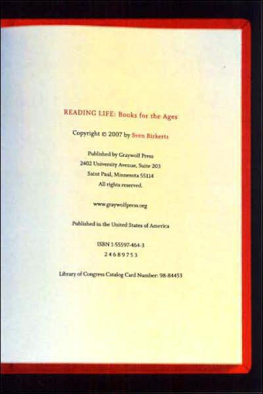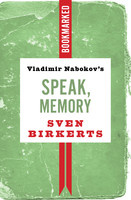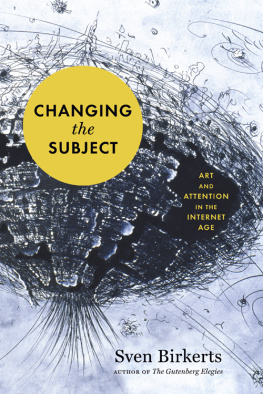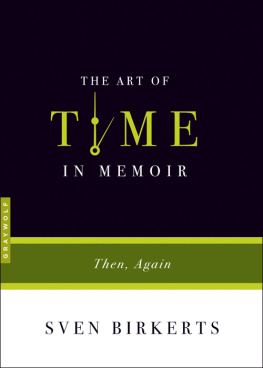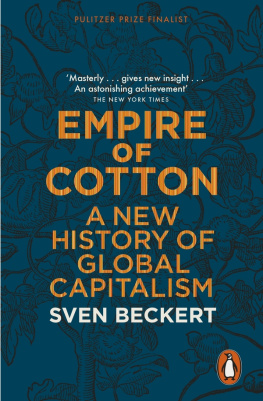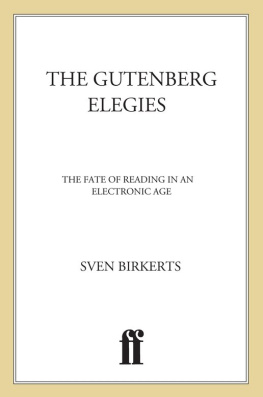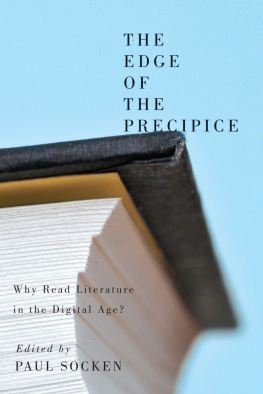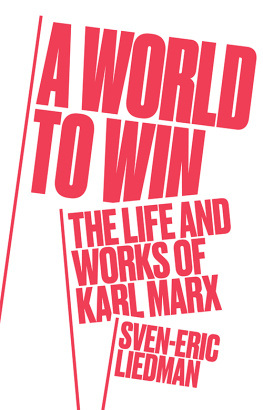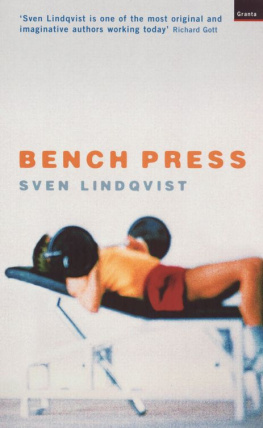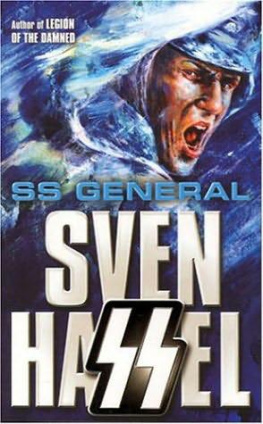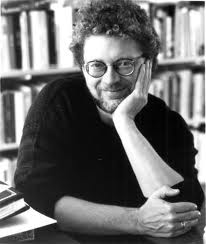Acknowledgments
Grateful thanks to the editors of the publications listed below for first publishing the following essays:
Loves Wound, Loves Salve: Knut Hamsuns Pan: American Scholar and Re-Readings, edited by Anne Fadiman (Farrar, Straus and Giroux, 2005).
Romancing the Self: Gustave Flauberts Madame BovaryAmerican Scholar
Live All You Can: Henry Jamess The Ambassadors: The Threepenny Review
The Mad Energies of Art: Saul Bellows Humboldts Gift": The Virginia Quarterly Review
The Possibility of the Search: Walker Percys The Moviegoer: The Believer
For their patience, acumen, willingness to humor and say the necessary hard thing I want to thank Lynn Focht, Chris Benfey, Askold Melnyczuk, Liam Rector, Tom Sleigh, Tom Frick, Anne Fadiman, Wendy Lesser, Bill Pierce, Dinah Lenney, Ted Genoways, Heidi Julavits, Fiona McCrae, and Anne Czarniecki.
Contents
The Reading Life
Childrens Crusade
J. D. Salingers The Catcher in the Rye
Loves Wound, Loves Salve Knut Hamsuns Pan
I Dont Believe That
D. H. Lawrences Women in Love
Romancing the Self
Gustave Flauberts Madame Bovary
The Mad Energies of Art
Saul Bellows Humboldts Gift
The Murderers Fancy Prose Style Vladimir Nabokovs Lolita
The Possibility of the Search
Walker Percys The Moviegoer
The Saddest Story, Indeed
Ford Madox Fords The Good Soldier
Live All You Can
Henry Jamess The Ambassadors
Into the Blue Paint
Virginia Woolfs To the Tighthouse
The Tether of Origins
Alice Munros The Beggar Maid: Stories of Flo and Rose
The Reading Life
When I was younger, before books had sorted themselves into different kinds of experiences, I read a great deal. I read in all directionsfor story, or because I was curious about a reputation, or hungered for some mood or atmosphere, or just because I had time on my hands and wanted to see where a particular path of words might take me. I miss those days, the excitement of wandering, that sense of the book as an unknown entity that could hold just about anything between its covers. For one of the sad consequences of reading many books for many years is that the map eventually starts to come clear, with fewer and fewer uncharted areas. And then with the passing of enough time the other thing disappears too, the languid leisure that is the spawning ground of the inner life. I dont ever now have time on my hands as I once did. The Protestant ethic has finally bent me to its will. Now when I do have any idleness it afflicts my conscience. What happened to simple being?
For any devoted reader the act is deeply, complexly bound up with inwardnesswith consciousness, sensibility, with whatever noun we choose to designate the murmur of awareness that accompanies usand carries usfrom first waking to sleep again. The words we readthe impressions, the narratives, the conversations and thoughts of charactersnot only touch our private sense of ourselves, but merge with it, shaping and directing it. After all, we use our own imaginative energy to bring the words to life and then project their contenttheir stuffonto the interior screen. There the world weve generated from the written signals glows vividly, or flickers faintly, or moves in and out of resolution, depending on who we are, what we are reading, and the wattage of our moods.
What is it that makes certain people become readers and others not? Its an ongoing mystery. Many people grow up in bookish environments and dont pick up the print addiction, while some of the fiercest book partisans had little or no early exposure whatsoever. Its hard to know what started them on their course. I opt for psychology over socialization: some people discover a deep gratification in the print transaction, others dont; certain temperaments are predisposed, most arent. As for what determines the predisposition, I wont presume to generalizeits hard enough for me to work down to the root of my own experience.
I believe that I came to reading out of a sense of solitary self-consciousness. This is the line connecting what I recall of my earliest childhood book-immersions with my life in the present. I dont mean that books were an answer to loneliness, not first and foremost, nor that they were a conventional ticket to imaginary other places (though I was hardly immune to the pleasures of transport). In fact, there are ways in which reading intensifies life in the here and now even as it takes us away. When I read, as I did obsessively, certain mysteries, like those in the Hardy Boys series, it was not just to lose myself inside the world of Frank and Joe Hardy. I was also taking the adrenaline of suspense and working it into my own life, borrowing from it, looking at my world through the frame of mystery. Weve all done the filmmaker pantomime, forming a box with forefinger and thumb of both hands, peering at whatever is right in front of us as if we were getting ready to film. Its a simple vantage shift, a way of sharpening the sense of the thing by defamiliarizing it. I found early on that moving through my day under the compression of an authors imagination had a similar effect. It was a way of involving myself more deeply while working with a removed perspective, and it cut against the ache of solitariness.
my basic feeling of disconnectedness never disappeared, it just changed its aspect. When I was a teen I embraced the then-fashionable term alienation. To be alienated was to be estranged, living askew. It was an intensifiedand voluntarily acceptedversion of what I had always felt. Living was dissonance; I registered a clear lack of harmony between inner and outer, between what I was thinking and feeling and what was required by the situation around meby family, teachers and friends.
Solitary self-consciousness, the experience of distance, the stress of being angled to the world, as well as the cottony solace of alienationall of these are part of the predisposition that leads to reading. But there is also a craving for whatever is not supplied by our worldly interactions, an intuition of other alignments, other scales of mattering, other possible tempos, almost as if turning pages and processing language produce a chemical surge in the system, some steadying vibration missing before.
I dont have specific memories about how I originally came into reading, except for one, very isolated, which was the jubilant, viscerally felt moment when a previously impenetrable line of printthe first sentence of Rudyard Kiplings The Jungle Book opened to me like a hard knot suddenly yielding. I was in the first grade, but fifty years later I can still feel that sudden availability of meaning, and the realization that it was not just a phrase, a sentence, giving way before me, but a whole universe that until a moment before had been sealed off.
Otherwise, though, the transitions are murky, how I might have shifted from one level, one depth or capacity, to another. Whats sure for me is that from that first cracking of the code Ive never not been a reader; Ive never moved too far away from that other reality made available by print. When I open a book, even now, I still have some expectation of changing my psychological vantage. But this is nothing like my earliest reading which, until I lost the power of that absorption, allowed what felt like an almost complete exchange of realities. What I feel these days is a strenuous give-and-take between perspectives, a tension between the immediacy of the present and the brightly conjured there of the book. Whats more, its generally not the erasure I crave, not complete vicariousness, but that peculiar doubleness, that oscillation between outer and inner. Something about energyattentionmoving between two poles, turning up the inner and dimming down the outer, compensates the imbalance, my sense of the world being, as William Wordsworth wrote, too much with us.

